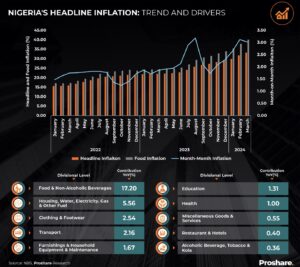The High Cost of Food in Nigeria: A Growing Crisis
According to the Nigerian Food Security Project (NFSP)’s 2024 Nigerian Food Security Index (NFSI), food security issues are escalating nationwide, and immediate action from policymakers is crucial.
The report, using data from 2023 to 2024, indicates a significant rise in poverty levels across several states, putting millions of Nigerians at risk of food insecurity. Prolonged inflation, economic instability, and a slow recovery from global economic downturns have driven the surge in people living below the poverty line.
This increase in poverty has a direct impact on access to nutritious and sufficient food, further deepening the food insecurity crisis. Even Lagos, often seen as Nigeria’s economic hub, has witnessed a significant rise in its indigent population, highlighting the widespread nature of the crisis.
Adebayo Adeleke, founder of the Nigeria Food Security Project, highlighted the need to address the issues outlined in the report. He noted that Nigeria’s food security has faced significant challenges for years. The country’s food systems, encompassing informal economies like farms and markets and underdeveloped logistical networks, require a localised approach to effectively address their complexities and devise sustainable solutions.
“Food security, like any form of security, is inherently local,” Adeleke said. He explained that a tailored food security index for Nigeria is crucial to evaluate the affordability, availability, sustainability, and quality of food in the country.
Adeleke also highlighted several intertwined challenges affecting Nigeria’s food security. These include a rapidly growing population that strains agricultural production and supply chains, rising poverty levels making food unaffordable for many, and a severe shortage of state-owned storage facilities that hinders efficient food reserve management, making stored food susceptible to spoilage. Significant increases in food prices disproportionately affect vulnerable populations, further limiting their access to food.

The Global Food Security Index (GFSI) offers a valuable global perspective but doesn’t fully address the unique circumstances of a nation as diverse as Nigeria. The Nigerian Food Security Index (NFSI) is specifically designed to account for these socio-economic and agricultural conditions. The NFSI analyses key factors such as population growth, income distribution by state, poverty levels, agricultural budgets, food price trends, and storage infrastructure.
This detailed assessment helps policymakers, development agencies, and stakeholders make informed decisions about resource allocation, agricultural investments, and targeted interventions. It identifies the most vulnerable populations and regions, ensuring resources are directed where they are most needed. Additionally, the NFSI tracks progress over time, enabling evaluations of policy effectiveness and pinpointing areas that require further attention.
In essence, the NFSI serves as a roadmap for creating a more resilient and food-secure future for Nigeria, addressing the country’s specific challenges while guiding the development of effective and sustainable solutions.
The report is an urgent call to action, stressing the need for swift and comprehensive interventions to reverse these negative trends and secure a food-secure future for all Nigerians. Adeleke further elaborated that the NFSI offers specific recommendations to address these challenges, including increased investment in agricultural infrastructure and targeted poverty alleviation programs. “A full examination of the report’s findings and recommendations is essential for understanding the complexity of the issues and the measures required to improve food security for all Nigerians,” he added.
Nigeria’s Food Inflation Problem
Nigeria’s food inflation has reached alarming levels. The National Bureau of Statistics (NBS) reported a food inflation rate of 39.93% in November 2024, up from 32.84% in November 2023. This persistent rise in food prices is driven by several factors, including rising energy and transportation costs, prolonged inflation, and economic instability.
The removal of fuel subsidies and the devaluation of the naira have significantly impacted the cost of food production and transportation. Additionally, insecurity in key agricultural regions has disrupted supply chains, leading to shortages and price hikes. The government’s efforts to address these issues, such as the introduction of duty-free import windows for food commodities, have yet to yield significant results.
The impact of food inflation is most acutely felt by vulnerable populations, who struggle to afford basic food items. The rise in food prices has also led to an increased reliance on food banks and other forms of assistance.
Addressing Nigeria’s food inflation problem requires a multifaceted approach. This includes fiscal measures to support local farmers, investments in agricultural infrastructure, and policies to stabilise the economy and improve food security.
READ: Stampede at Funfair in Ibadan Claims several Lives
Content Credit| Ajibola Emmanuel Adebayo
Picture Credit | https://businesspost.ng/general/apprehension-as-26-5-million-nigerians-risk-food-insecurity-in-2024/




